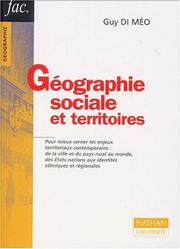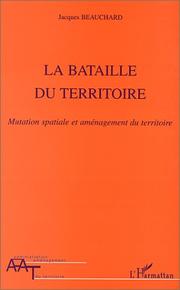| Listing 1 - 10 of 19 | << page >> |
Sort by
|

ISBN: 2091912034 9782091912035 Year: 2001 Publisher: Paris : Nathan Université,
Abstract | Keywords | Export | Availability | Bookmark
 Loading...
Loading...Choose an application
- Reference Manager
- EndNote
- RefWorks (Direct export to RefWorks)
Géographie sociale. --- Espace (économie politique). --- Géographie humaine. --- Territorialité humaine.
Book
Year: 1962 Publisher: Bruxelles : Editions de la Librairie Encyclopédique,
Abstract | Keywords | Export | Availability | Bookmark
 Loading...
Loading...Choose an application
- Reference Manager
- EndNote
- RefWorks (Direct export to RefWorks)
Économie régionale. --- Aménagement du territoire. --- Espace (économie politique)
Book
Year: 2024 Publisher: Bruxelles : Bruylant,
Abstract | Keywords | Export | Availability | Bookmark
 Loading...
Loading...Choose an application
- Reference Manager
- EndNote
- RefWorks (Direct export to RefWorks)
Espace économique européen. --- Espace (économie politique) --- Libre-échange --- Intégration économique
Book
ISBN: 9781472483799 9781315598888 9781317085676 Year: 2017 Publisher: London Routledge, Taylor and Francis Group
Abstract | Keywords | Export | Availability | Bookmark
 Loading...
Loading...Choose an application
- Reference Manager
- EndNote
- RefWorks (Direct export to RefWorks)
Space, place and territory are concepts that lie at the core of geography and urban planning, environmental studies and sociology. Although space, place and territory are indeed polysemic and polemic, they have particular characteristics that distinguish them from each other. They are interdependent but not interchangeable, and the differences between them explain how we simultaneously perceive, conceive and design multiple spatialities. After drawing the conceptual framework of space, place and territory, the book initially explores how we sense space in the most visceral ways, and how the overlay of meanings attached to the sensorial characteristics of space change the way we perceive it - smell, spatial experiences using electroence phalography, and the changing meaning of darkness are discussed. The book continues exploring cartographic mapping not as a final outcome, but rather as an epistemological tool, an instrument of inquiry. It follows on how particular ideas of space, place and territory are embedded in specific urban proposals, from Brasília to the Berlin Wall, airports and infiltration of digital technologies in our daily life. The book concludes by focusing on spatial practices that challenge the status quo of how we perceive and understand urban spaces, from famous artists to anonymous interventions by traceurs and hackers of urban technologies. Combining space, place and territory as distinctive but interdependent concepts into an epistemological matrix may help us to understand contemporary phenomena and live them critically.
City planning --- Space in economics --- Urbanisme --- Espace (économie politique) --- Environmental planning --- urban planning --- Economic geography --- Urbanisme. --- Espace (économie politique)

ISSN: 1284604X ISBN: 2738487041 9782738487049 Year: 2000 Publisher: Paris, Montréal : Harmattan,
Abstract | Keywords | Export | Availability | Bookmark
 Loading...
Loading...Choose an application
- Reference Manager
- EndNote
- RefWorks (Direct export to RefWorks)
Book
Year: 1977 Publisher: Paris : Presses Universitaires de France,
Abstract | Keywords | Export | Availability | Bookmark
 Loading...
Loading...Choose an application
- Reference Manager
- EndNote
- RefWorks (Direct export to RefWorks)
Book
ISBN: 9781784718121 Year: 2015 Publisher: Cheltenham, UK ; Northampton, MA : E.dward Elgar Publishing,
Abstract | Keywords | Export | Availability | Bookmark
 Loading...
Loading...Choose an application
- Reference Manager
- EndNote
- RefWorks (Direct export to RefWorks)
In this comprehensive second edition of The Economics of International Integration, Miroslav N. Jovanovic examines the theory of international economic integration and explores the existing and emerging international integration agreements, their achievements, problems and prospects.
Book
ISBN: 2724606043 224701335X 2724606337 9782247013357 9782724606041 Year: 1993 Publisher: Paris : Presses de la Fondation nationale des sciences politiques : Dalloz,
Abstract | Keywords | Export | Availability | Bookmark
 Loading...
Loading...Choose an application
- Reference Manager
- EndNote
- RefWorks (Direct export to RefWorks)
International relations --- Relations internationales --- Sciences sociales. --- Géopolitique. --- Relations internationales. --- Civilisation moderne --- International relations. --- Political geography. --- Civilisation --- Espace (économie politique) --- Géographie économique. --- Systémique. --- Géopolitique. --- Espace (économie politique) --- Géographie économique. --- Systémique.
Book
ISSN: 19548176 ISBN: 9782717871326 2717871322 Year: 2020 Publisher: Paris : Économica,
Abstract | Keywords | Export | Availability | Bookmark
 Loading...
Loading...Choose an application
- Reference Manager
- EndNote
- RefWorks (Direct export to RefWorks)
"Ce manuel composé de six chapitres analyse le champ de l'économie du secteur public local. Il présente les principaux arguments économiques en faveur de la décentralisation des décisions publiques et aborde un ensemble de concepts et d'instruments traitant des relations entre l'espace et l'action des collectivités territoriales. Les analyses empiriques décrites dans cet ouvrage complètent la présentation et illustrent les diverses dimensions du sujet traité. Elles montrent que les déterminants des choix publics locaux sont d'ordre à la fois économique, démographique, politique, spatial et institutionnel. Cet ouvrage s'adresse en priorité aux étudiants et chercheurs intéressés par l'économie publique locale. Il se veut également accessible à un large public et invite à réfléchir sur les enjeux et les perspectives de la décentralisation."
Économie régionale. --- Économie urbaine. --- Finances locales. --- Administration locale. --- Espace (économie politique) --- Économie publique. --- Finance, Public --- Economic development --- Regional planning --- Fiscal policy --- Administration locale --- Économie régionale. --- Économie urbaine. --- Espace (économie politique) --- Économie publique.
Book
ISBN: 9782354801809 2354801807 Year: 2018 Publisher: Paris : Éditions Amsterdam,
Abstract | Keywords | Export | Availability | Bookmark
 Loading...
Loading...Choose an application
- Reference Manager
- EndNote
- RefWorks (Direct export to RefWorks)
Partout et constamment, la logique de l’accumulation capitaliste bouleverse les équilibres économiques et politiques, la technique et le travail, l’environnement et le climat, les sociétés et les formes de vie. Le capitalisme est, à quelque échelle qu’on le considère, un système de production de l’espace, c’est-à-dire un pouvoir de façonner les lieux, de modifier en profondeur les paysages, de transformer les rapports spatio-temporels. L’uniformisation du monde par le marché implique en effet une incessante prolifération des différences – économiques, sociales, géographiques, culturelles, géopolitiques. Ce dynamisme même fait du capitalisme un ensemble instable, en proie à des crises chroniques, perpétuellement contraint d’inventer des « solutions spatiales » aux contradictions qui le minent et aux catastrophes diverses qu’elles engendrent.
Communism and geography --- Urban geography --- Urban economics --- Marxian economics --- Space in economics --- Capitalism --- Capitalisme --- Mondialisation --- Géographie (discipline) --- Espace (économie politique). --- Géographie économique. --- Géographie marxiste. --- Géographie urbaine. --- Géographie sociale. --- Philosophie. --- Analyse marxiste.
| Listing 1 - 10 of 19 | << page >> |
Sort by
|

 Search
Search Feedback
Feedback About UniCat
About UniCat  Help
Help News
News